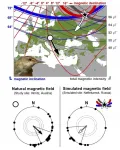The effects of antidepressant drugs evaluated through the analysis of patients' tweet
Scientists have identified behavioural and linguistic changes in tweets in Spanish published by users suffering from depression and who are taking medication to treat this disease.
2021-02-12
(Press-News.org) Researchers of the Research Programme on Biomedical Informatics (GRIB) from UPF and Hospital del Mar Medical Research Institute (IMIM) in Barcelona, Spain, have identified behavioural and linguistic changes in tweets in Spanish published by users suffering from depression and who are taking medication to treat this disease.
Their work has been published in Journal of Medical Internet Research and was led by Ferran Sanz; with Angela Leis and Francesco Ronzano as first authors, who conducted the work together with Miguel Angel Mayer and Laura I Furlong, all from the Integrative Biomedical Informatics research group.
Depression is one of the most widespread mental illnesses. According to the World Health Organization, it affects more than 322 million people of all ages and is one of the leading causes of disability worldwide.
The possibility of analysing massive data shared on social networks provides us with new opportunities to better understand the behaviour of their users. In this study, using Big Data and text mining, the scientists analysed tweets by users who mentioned they were taking drugs for the treatment of depressive disorders. The main goal was to detect the effects of this medication through changes in the language used in their tweets or in the way these people used Twitter.
In a previous study, the team of researchers observed that users of Twitter who potentially suffer from depression display specific behavioural and linguistic features. This article focuses on the changes in the features of the messages that may be associated with treatment with antidepressant drugs.
The most notable results revealed that during periods in which users stated they were receiving antidepressant drug treatment their Twitter activity increased with longer messages but posting fewer messages at night. They also interacted more with other users (for example, through an increase in number of mentions per tweet, which may reflect an interest in interacting with other people) and also an increase in positive emotions, related to happiness and surprise. "We can state that the behavioural patterns of people who are in treatment with antidepressant drugs change and tend to resemble those of people who do not suffer from depression", Angela Leis details.
There are various types of antidepressant drugs, and this study focuses specifically on selective serotonin reuptake inhibitors, which are the most commonly prescribed drug for treating depression. First, they selected timelines of users mentioning SSRI antidepressants in their tweets. Then, "we analysed changes in behavioural and linguistic features in the tweets posted while users were in treatment, in comparison with tweets posted by the same users when it was less likely that they were taking these drugs", Francesco Ronzano explains. 186 users and their timelines with 668,842 tweets were finally included in the study.
"The use of techniques based on Big Data and text mining, which enable detecting changes in the way in which users interact in their social networks, such as Twitter, can provide us with new opportunities to follow up and monitor patients suffering from one of the most widespread, disabling health problems as is depression", concludes Ferran Sanz, full professor with the UPF Department of Experimental and Health Sciences (DCEXS) and director of the Research Programme on Biomedical Informatics (GRIB) of the IMIM and UPF.
INFORMATION:
Reference article:
Leis A, Ronzano F, Mayer MA, Furlong LI, Sanz F. Evaluating Behavioral and Linguistic Changes During Drug Treatment for Depression Using Tweets in Spanish: Pairwise Comparison Study. J Med Internet Res. 2020 Dec. doi: 10.2196/20920.
[Attachments] See images for this press release:

ELSE PRESS RELEASES FROM THIS DATE:
2021-02-12
Fast and energy-efficient future data processing technologies are on the horizon after an international team of scientists successfully manipulated magnets at the atomic level.
Physicist Dr Rostislav Mikhaylovskiy from Lancaster University said: "With stalling efficiency trends of current technology, new scientific approaches are especially valuable. Our discovery of the atomically-driven ultrafast control of magnetism opens broad avenues for fast and energy-efficient future data processing technologies essential to keep up with our data hunger."
Magnetic materials are heavily used in modern life with applications ranging from fridge magnets to Google and Amazon's ...
2021-02-12
Birdwatchers get very excited when a 'rare' migratory bird makes landfall having been blown off-course and flown beyond its normal range. But these are rare for a reason; most birds that have made the journey before are able to correct for large displacements and find their final destination.
Now, new research by an international team shows for the first time, how birds displaced in this way are able to navigate back to their migratory route and gives us an insight into how they accomplish this feat.
Writing in Current Biology, the team from Bangor and Keele Universities describe how reed warblers can navigate from a 'magnetic position' beyond what they have ...
2021-02-12
What The Study Did: These findings suggest that treatment with zinc, ascorbic acid or both doesn't affect SARS-CoV-2 symptoms.
Authors: Milind Y. Desai, M.D., M.B.A., of the Cleveland Clinic in Ohio, is the corresponding author.
To access the embargoed study: Visit our For The Media website at this link https://media.jamanetwork.com/
(doi:10.1001/jamanetworkopen.2021.0369)
Editor's Note: The article includes conflict of interest disclosures. Please see the article for additional information, including other authors, author contributions and affiliations, conflict of interest and financial disclosures, and funding and support.
INFORMATION:
Media advisory: The full study is linked to ...
2021-02-12
What The Study Did: Pediatric admissions to U.S. hospitals decreased last year across an array of pediatric conditions and some may represent unmet needs in pediatric care during the COVID-19 pandemic.
Authors: Christopher M. Horvat, M.D., M.H.A., of UPMC Children's Hospital of Pittsburgh, is the corresponding author.
To access the embargoed study: Visit our For The Media website at this link https://media.jamanetwork.com/
(doi:10.1001/jamanetworkopen.2020.37227)
Editor's Note: The article includes conflict of interest and funding/support disclosures. Please see the article for additional information, including other authors, author contributions and affiliations, conflict of interest and financial disclosures, and funding and support.
INFORMATION:
Media advisory: ...
2021-02-12
What The Study Did: This observational study investigated the sensitivity of antibody tests to detect previous SARS-CoV-2 infection using existing clinical data across the University of California Health system.
Authors: Atul J. Butte, M.D. Ph.D., of the University of California, San Francisco, is the corresponding author.
To access the embargoed study: Visit our For The Media website at this link https://media.jamanetwork.com/
(doi:10.1001/jamanetworkopen.2021.0337)
Editor's Note: The article includes conflict of interest and funding/support disclosures. Please ...
2021-02-12
TROY, N.Y. -- An antioxidant found in green tea may increase levels of p53, a natural anti-cancer protein, known as the "guardian of the genome" for its ability to repair DNA damage or destroy cancerous cells. Published today in END ...
2021-02-12
What The Study Did: This case series analyzes brains from autopsies of patients who died of COVID-19 as confirmed by nucleic acid test and with severe pulmonary pathology.
Authors: David W. Nauen, M.D., Ph.D., of Johns Hopkins University in Baltimore, is the corresponding author.
To access the embargoed study: Visit our For The Media website at this link https://media.jamanetwork.com/
(doi:10.1001/jamaneurol.2020.0225)
Editor's Note: The article includes conflicts of interest disclosures. Please see the article for additional information, including other authors, author contributions and affiliations, ...
2021-02-12
PHILADELPHIA--The "scarred villain" is one of the oldest tropes in film and literature, from Scar in "The Lion King" to Star Wars' Darth Vader and the Joker in "The Dark Knight." The trope is likely rooted in a long-evolved human bias against facial anomalies -- atypical features such as growths, swelling, facial paralysis, and scars. A new brain-and-behavior study from researchers in the Perelman School of Medicine at the University of Pennsylvania illuminates this bias on multiple levels.
The researchers, whose findings were published this week in the Annals of the New York Academy of Sciences, used surveys, social simulations, and functional MRI (fMRI) studies to study hundreds of participants' responses and attitudes towards ...
2021-02-12
Since ancient times, St. John's Wort has been used as a medicinal herb covering a wide range of applications such as the treatment of burns, skin injuries, neuralgia, fibrosis, sciatica and depression. Due to its high medicinal potential, the plant known in technical terminology as Hypericum perforatum even became "Medicinal Plant of the Year" in 2015. Now, scientists at TU Dresden have shown that there is much more to the herb than its healing properties.
To this end, two interdisciplinary groups from biology and inorganic chemistry have joined forces and thus achieved astonishing results.
Originally, the research groups led by botanist Prof. Stefan Wanke ...
2021-02-12
Less intense mean daily precipitation, more intense and localised extreme events. This is what the future climate scenarios indicate for the Eastern Alps, according to the study "Evaluation and Expected Changes of Summer Precipitation at Convection Permitting Scale with COSMO-CLM over Alpine Space", published by the CMCC Foundation in the journal Atmosphere. The research is conducted in the context of the European project H2020 EUCP (European Climate Prediction system) and contributes to the work of the international scientific community for the development of climate models that can support ...
LAST 30 PRESS RELEASES:
[Press-News.org] The effects of antidepressant drugs evaluated through the analysis of patients' tweet
Scientists have identified behavioural and linguistic changes in tweets in Spanish published by users suffering from depression and who are taking medication to treat this disease.




